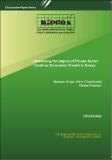| dc.date.accessioned | 2021-07-05T05:45:42Z | |
| dc.date.available | 2021-07-05T05:45:42Z | |
| dc.date.issued | 2020 | |
| dc.identifier.uri | http://repository.kippra.or.ke/handle/123456789/3032 | |
| dc.description.abstract | In many economies, private sector credit plays a critical role by efficiently
allocating resources for investment and is considered to be an engine of
economic growth. This study examined the impact of the interest rate cap on
credit uptake by different sectors and also the impact of private sector credit
on economic growth. The HP filter, ARDL approach to cointegration are used
to assess these impacts. The results show that capping of interest rates led to
an average decline of total credit by about 4.3 per cent per month from its precapping
level. In terms of sectoral credit uptake, the ARDL estimates reveal that,
on average, the agriculture sector experienced the largest decline of about 5.4
per cent relative to other sectors. The study finds that there is a positive and
significant long-run and short-run relationship between access to private sector
credit and real GDP growth in Kenya. The elasticity of real GDP growth with
respect to private sector credit is about 0.25 and is statistically significant and
economically important. This relationship suggests that the short fall in private
sector credit (of approximately 4.3%) following the introduction of interest rate
caps is associated conservatively with a shortfall in real GDP growth of about 1.1
per cent relative to the baseline (pre-capping period). This is a massive drag on
growth and jobs, holding back the country from making progress in promoting
inclusive growth. The findings from this paper go a long way in plugging a huge
information gap on the part of policy makers on the impact of interest rate caps
on growth in Kenya. Policies to enhance access to private sector access remains
top priority, including during the COVID-19 pandemic. Accelerating private
sector’s contribution is extremely important especially at a time when public
sector investment is constrained and the economy reeling from the impact of
corona virus. Policies to support firms to access liquidity and credit remain very
critical both during the crisis phase and more importantly during the recovery
phase. | en |
| dc.language.iso | en | en |
| dc.publisher | The Kenya Institute for Public Policy Research and Analysis (KIPPRA) | en |
| dc.relation.ispartofseries | DP/239/2020; | |
| dc.subject | Economic Growth | en |
| dc.subject | Private Sector Credit | en |
| dc.subject | Interest Rate Cap | en |
| dc.subject | Kenya | en |
| dc.title | Discussion Paper No. 239 of 2020 on Assessing the Impact of Private Sector Credit on Economic Growth in Kenya | en |
| dc.type | KIPPRA Publications | en |
| ppr.contributor.author | Kiriga, Benson ; Chacha, Terry & Daniel Omanyo | |

